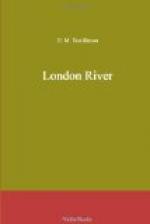though motionless. The walls enclosing the Pool
are spectral in a winter light, and might be no more
than the almost forgotten memory of a dark past.
Looking at them intently, to give them a name, the
wayfarer on the bridge could imagine they were maintained
there only by the frail effort of his will.
Once they were, but now, in some moods, they are merely
remembered. Only the men busy on the deck of
the ship below are real. Through an arch beneath
the feet a barge shoots out noiselessly on the ebb,
and staring down at its sudden apparition you feel
dizzily that it has the bridge in tow, and that all
you people on it are being drawn unresisting into
that lower world of shades. You release yourself
from this spell with an effort, and look at the faces
of those who are beside you at the parapet. What
are their thoughts? Do they know? Have
they also seen the ghosts? Have they felt stirring
a secret and forgotten desire, old memories, tales
that were told? They move away and go to their
desks, or to their homes in the suburbs. A vessel
that has hauled into the fairway calls for the Tower
Bridge gates to be opened for her. She is going.
We watch the eastern mists take her from us.
For we never are so passive and well-disciplined to
the things which compel us but rebellion comes at times—misgiving
that there is a world beyond the one we know, regret
that we never ventured and made no discovery, and
that our time has been saved and not spent. The
gates to the outer world close again.
There, where that ship vanished, is the highway which
brought those unknown folk whose need created London
out of reeds and mere. It is our oldest road,
and now has many bypaths. Near Poverty Corner
is a building which recently was dismissed with a
brief, humorous reference in a new guide to our City—a
cobbled forecourt, tame pigeons, cabs, a brick front
topped by a clock-face: Fenchurch Street Station.
Beyond its dingy platforms, the metal track which
contracts into the murk is the road to China, though
that is, perhaps, the last place you would guess to
be at the end of it. The train runs over a wilderness
of tiles, a grey plateau of bare slate and rock, its
expanse cracked and scored as though by a withering
heat. Nothing grows there; nothing could live
there. Smoke still pours from it, as though it
were volcanic, from numberless vents. The region
is without sap. Above its expanse project superior
fumaroles, their drifting vapours dissolving great
areas. When the track descends slightly, you
see cavities in that cliff which runs parallel with
your track. The desert is actually burrowed,
and every hole in the plateau is a habitation.
Something does live there. That region of burnt
and fissured rock is tunneled and inhabited.
The unlikely serrations and ridges with the smoke
moving over them are porous, and a fluid life ranges
beneath unseen. It is the beginning of Dockland.
That the life is in upright beings, each with independent




